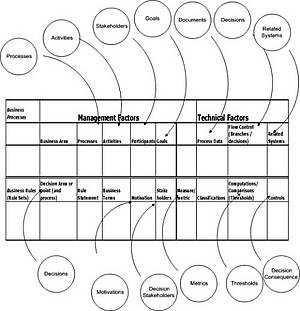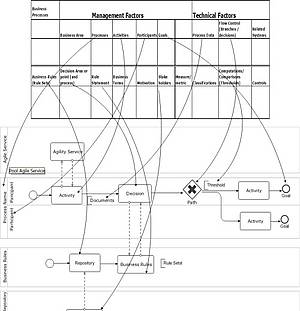Business Agility is the ability to run profitably in changing economic conditions by producing high-quality, customer-focused goods and services. Theorists in business management and technology agree the key to achieving agility is in a focus on business processes.
For instance, In the February, 2007 issue of Harvard Business Review, “How Managers’ Everyday Decisions Create or Destroy Your Companies Strategy”, Bower and Gilbert describe intransigence of sales personnel at dealerships for a leading automotive manufacturer. The sales personnel would not ‘push’ sales for a low cost car, built to meet challenges from low-cost competition. The lack of incentive (or disincentive) to sell the car ruined the strategy, despite the product quality and market demand. This led me to infer that decisions without consequences are just suggestions, no matter who makes them. Bower and Gilbert surmise that firms should ‘Align bottom-up processes with top-down objectives’, or conduct due diligence in processes governance.
I would argue the automotive manufacturer’s product is a business agility failure of sales and marketing. The firm failed to develop incentives for existing salespersons, or a new sales team. ‘Aligning bottom-up practices with top-down objectives’ must be done with an eye on the agility factors involved: Sales and Marketing, Business Delivery, Personnel and Information Technology. In the future, all firms considering new resource allocations should consider a due-diligence effort that examines all the agility factors. And this in not just a suggestion, – the outcomes are obvious.
What to consider
Many thought leaders in business and technology believe Business Process Management (BPM) and Business Rules (Decision Management) is critical to achieving business agility. Business agility is not the immediate result of BPM and Business Rules. Business agility happens once core processes and decisions achieve a certain maturity. That is: they are documented and understood, institutionalized throughout the firm and added to the enterprise architecture. Then, processes can be choreographed as components that are technology agile (process maturity level 4). BPM/Rules is well suited to integrate statistical analysis of data into enterprise decision management. Many ‘technical’ agility tactics work by ‘tweaking’ the decision factors of the choreography with these statistics. For instance, a firm might aim subtle shifts in behavior according to an analysis of past performance: information decisions and outcome. Other, less diaphanous, tactics might require rewriting business rules that control a decision point in a process. Business agility uses these technically agile capabilities to achieve performance acceleration in a business area.
As firms ‘align their processes’, they should decide what type of agility is important for their strategies. For instance, agility in product variety may be critical for a consumer product company, whereas product variety is less important to a commodity producer. Therefore process due-diligence should identify and prioritize the type of business agility that is important to their strategies. Next firms should match these with a list of objectives for processes and business rules. It is a context for arranging the knowledge in the firm into a form that can become an agile, process-decision driven organization.
What to Do
Organization documenting processes and decisions complete a planning matrix such as the figure below. Processes are comprised of process participants, activities, and flow control and process data. Where flow control branches, or decides with the data, business rules should are defined. Business rules formalize a decision, or flow control point in the process.
Processes achieve a goal for the organization and goals are measured (or instrumented) with metrics. Many of these goals should be to improve core processes performance – agility goals. In turn, this might lead to developing more processes. Processes carry the data needed to compute these metrics; however, metrics must be informed by business rules (decisions).
The next diagram suggests how you might move this into a technical infrastructure. Each of the appropriate information plays a role in the technology.
The outcome should be to create business processes and business policies and supporting services that carry out agility objectives. This is the beginning of an iterative process, a starting point for building a core set of services that support business agility.
Obviously, an application built around processes and rules cannot replace the knowledge and intelligence needed to perform research or create new products and services. Yet most research or product development projects have clearly defined process activities and decision points. Digitizing these processes might be strengthened with decision analytics. At this point firms will better understand the resources and time required to complete them.
There are many native benefits to BPM/Rules that improve agility. For instance, workloads can be optimized among business units. The result should be a portfolio of agile processes and process features that increase agile responses to economic or competitive challenges.
Outcome: An Agile Core
Over time, companies that incorporate agility into their process/policy (rules) strategies will build an agility ‘back bone’ or agility core. An agile core is a collection of common process/rules/information structures that business agile processes will need to act on a simple level, as in the figure above. These underpinnings, including vocabulary, product/services, organizations, and personnel and training data structure should be critical to every process, and therefore every BPM/Rules initiative. What an agile core of services offers is a resource for:
- Accelerated understanding
- Instrumentation and control of critical programs in a firm
- Improved, even surgical, governance of policies and compliance
- Improved accuracy
In the business case of the automotive manufacturer: had the firm considered the agility of its sales staff the result might have been different. Specifically, a base set of policies about sales management probably exists. A core process, with stakeholders and decisions should exist for changing this policy and aligning it with corporate strategy. Agile businesses can do this rapidly. This type of thinking is multidimensional and considers all the factors, core and agile. This will improve performance of either an entire business strategy or a business project.



















